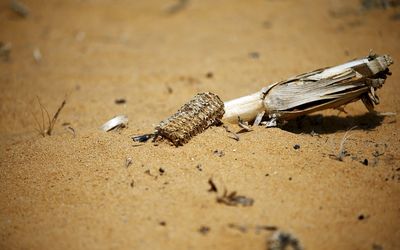THE government has "reprioritised" R1bn for drought relief in 2015-16, with the Budget Review recognising that the worst drought in at least 20 years is threatening agricultural output and will push up food prices.
Finance Minister Pravin Gordhan also announced that R2.8bn had been allocated in the medium term to Fetsa Tlala, a food security initiative under which the Agriculture, Forestry and Fisheries Department aimed to bring 120,000ha of land into productive use, benefiting 145,000 subsistence and smallholder producers a year.
But Agri SA, which earlier this week called for the government to provide R12bn of drought relief over three years, said food security in SA and southern Africa should have been the government’s top priority, and said the drought relief package was inadequate.
"We don’t think it was sufficient to provide food security for our country going forward," said Agri SA CE Omri van Zyl.
It wanted wage subsidies for farm workers, support for feed and fodder to sustain farmers through winter, and R11bn of financial guarantees for farmers. Increased social grants would not go far if food was not affordable. The agricultural sector employed 800,000 people and farm businesses folding could severely affect job losses and rural communities, he said.
The R1bn includes R502m already reprioritised to deliver water and refurbish boreholes, and R318m to move cattle and transport drinking water, among other things. The Rural Development and Land Reform Department had provided R187m to distribute animal feed, the Budget Review said. Disaster relief grants to provinces and municipalities to distribute water were also proposed.
Gordhan said that while overall agricultural output was down, there had been strong growth in several export products, including nuts and berries, grapes, and deciduous and citrus fruits.
Van Zyl said the risk was that food production would be lost permanently, creating social and economic problems for SA and the region. "This is not a short-term issue, and you can put a plaster on, but in the longer term we need to make sure we maintain production," he said.

Picture: REUTERS/SIPHIWE SIBEKO
THE government has "reprioritised" R1bn for drought relief in 2015-16, with the Budget Review recognising that the worst drought in at least 20 years is threatening agricultural output and will push up food prices.
Finance Minister Pravin Gordhan also announced that R2.8bn had been allocated in the medium term to Fetsa Tlala, a food security initiative under which the Agriculture, Forestry and Fisheries Department aimed to bring 120,000ha of land into productive use, benefiting 145,000 subsistence and smallholder producers a year.
But Agri SA, which earlier this week called for the government to provide R12bn of drought relief over three years, said food security in SA and southern Africa should have been the government’s top priority, and said the drought relief package was inadequate.
"We don’t think it was sufficient to provide food security for our country going forward," said Agri SA CE Omri van Zyl.
It wanted wage subsidies for farm workers, support for feed and fodder to sustain farmers through winter, and R11bn of financial guarantees for farmers. Increased social grants would not go far if food was not affordable. The agricultural sector employed 800,000 people and farm businesses folding could severely affect job losses and rural communities, he said.
The R1bn includes R502m already reprioritised to deliver water and refurbish boreholes, and R318m to move cattle and transport drinking water, among other things. The Rural Development and Land Reform Department had provided R187m to distribute animal feed, the Budget Review said. Disaster relief grants to provinces and municipalities to distribute water were also proposed.
Gordhan said that while overall agricultural output was down, there had been strong growth in several export products, including nuts and berries, grapes, and deciduous and citrus fruits.
Van Zyl said the risk was that food production would be lost permanently, creating social and economic problems for SA and the region. "This is not a short-term issue, and you can put a plaster on, but in the longer term we need to make sure we maintain production," he said.














 News, views and analysis of Finance Minister Pravin Gordhan's 2016 budget
News, views and analysis of Finance Minister Pravin Gordhan's 2016 budget







Change: -0.47%
Change: -0.57%
Change: -1.76%
Change: -0.34%
Change: 0.02%
Data supplied by Profile Data
Change: -1.49%
Change: 0.08%
Change: -0.47%
Change: 0.00%
Change: -0.04%
Data supplied by Profile Data
Change: -0.34%
Change: 0.03%
Change: -0.10%
Change: -0.22%
Change: -0.69%
Data supplied by Profile Data
Change: -0.28%
Change: -1.15%
Change: -0.07%
Change: -1.21%
Change: -0.22%
Data supplied by Profile Data